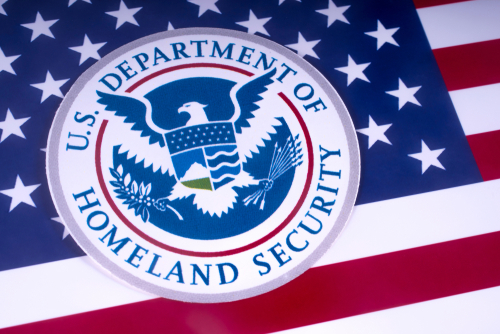
The chairman of the House Committee on Homeland Security opened Wednesday’s hearing on global terrorism criticizing President Donald Trump and his bid to name a new acting director of the Department of Homeland Security (DHS), on the day before Kevin McAleenan was scheduled to end his five-month tenure as acting director.
U.S. Rep. Bennie Thompson (D-MS) was reacting to reports the White House is searching for a legal loophole that would enable President Trump to name Ken Cuccinelli, the acting director of U.S. Citizenship and Immigration, or Mark Morgan, the acting commissioner of U.S. Customs and Border Protection (CBP), to succeed McAleenan, despite concerns doing so would skirt legal requirements.
“Reports that President Trump is desperately combing through federal law to find a loophole to make an end-run around the Constitution are disappointing but not surprising,” Thompson said to kick off the hearing. “If the White House cannot find anyone qualified and suitable to run the Department of Homeland Security – or even run it in an acting capacity – something is very wrong with this Administration.” Thompson called on the White House to immediately disavow the reports.
McAleenan is the fourth permanent or acting director of DHS to serve since the onset of the Trump administration in January 2017.
Under the law, acting officials who take over cabinet-level positions must be next in the line of succession, have the approval of the Senate or have served 90 days under the previous secretary. However, reports have emerged in the last few days the White House is exploring a loophole in the law that would allow someone to be the assistant secretary of the Countering Weapons of Mass Destruction Office, which is vacant, and then elevate that person to be the acting secretary of homeland security. The chief of that office is known as an “inferior officer,” and under an exception in the laws governing appointments, such officials can be appointed to acting positions with the sole approval of the president.
Thompson noted there is no Senate-confirmed deputy secretary of DHS, and the leaders of U.S. Immigration and Customs Enforcement (ICE), CBP, U.S. Citizenship and Immigration Services (USCIS) and the Federal Emergency Management Agency (FEMA) are all acting.
McAleenan, who has served as director since April, said upon questioning he does not believe an absence of a director of DHS will be a major hindrance to the agency’s operations and said Christopher Krebs, the current director of the Department’s Cybersecurity and Infrastructure Security Agency (CISA), would provide “capable” management of the agency on an interim basis.
When asked by U.S. Rep. Kathleen Rice (D-NY) of the Cuccinelli and Morgan rumors, McAleenan declined to comment but assured lawmakers that all laws and regulations will be followed in naming his successor.
Both Cuccinelli and Morgan, who joined DHS in recent months in an acting capacity, were thought to be eliminated from eligibility to head the agency after the Department of Justice’s Office of Legal Counsel issued a legal opinion that their appointment would violate the Vacancies Act. Neither one was confirmed by the Senate.
“Even though Acting Secretary McAleenan is leaving tomorrow, the President has yet to announce who his replacement will be,” said Thompson. “What is the delay? Overnight, we learned the White House may be trying to find a legal loophole to install the President’s pick, who is not in the Department’s order of succession, as Acting Secretary. This is completely unacceptable, and such a decision would raise serious constitutional questions. Also unacceptable is the fact that the Transportation Security Administration Administrator has been dual-hatted as Acting Deputy Secretary of Homeland Security for the last six months.”
When pressed by Thompson on whether he would agree to continue as acting director after tomorrow, McAleenan dodged a direct answer but said he would “ensure a smooth transition,” as he told President Trump in his letter of resignation.
Also during the hearing, McAleenan cited the acquisition of biological weapons by terrorist groups as a major emerging threat for which DHS is working with the private sector to defend. “I do think this is something that is going to be hard to chase,” he said.
“The increased diversity in biological and health-related threats is concerning,” McAleenan also stated in his written testimony. “Advances in biotechnology are changing the threat agent landscape, and the decreasing cost and access of dual-use technologies and materials will inevitably expand the threat actor landscape as well.”
In his written statement, McAleenan also cited potential security threats posed by emerging 5G mobile technology through call interception and monitoring, user location tracking, cyber actors seeking financial gain through banking fraud, social engineering, ransomware, identity theft, or theft of the device, services, or any sensitive data.
Russell Travers, acting director of the National Counterterrorism Center, Office of the Director of National Intelligence, estimated that despite pronouncements of the demise of ISIS, U.S. and foreign intelligence estimate there are at least 14,000 ISIS members in Iraq and Syria, compared to just 1,000 five years ago.
FBI Director Christopher Wray cited the emergence of cryptocurrency as a major concern by law enforcement because of the anonymization that occurs in enabling transactions by wrongdoers.
Also appearing at the hearing was David Glawe, Under Secretary in the Office of Intelligence and Analysis at DHS.




